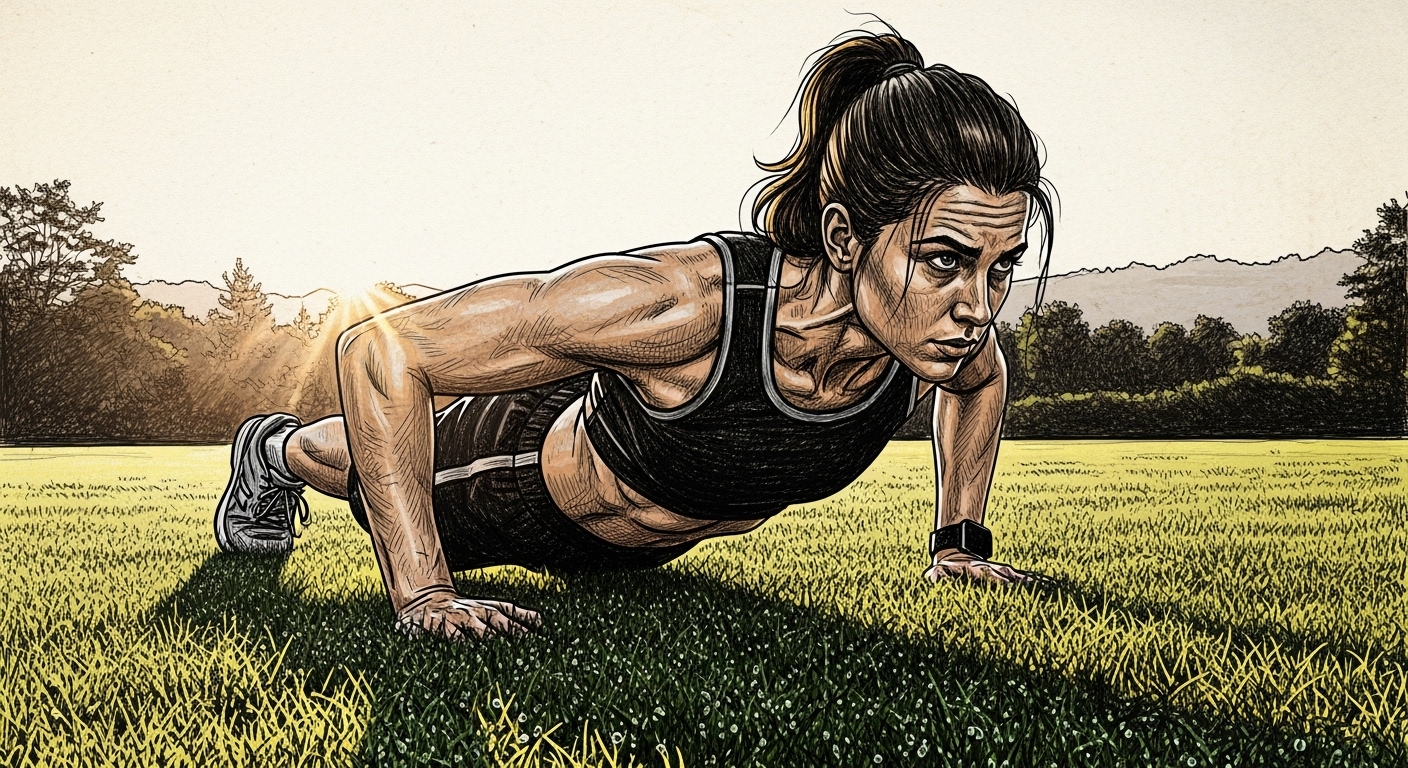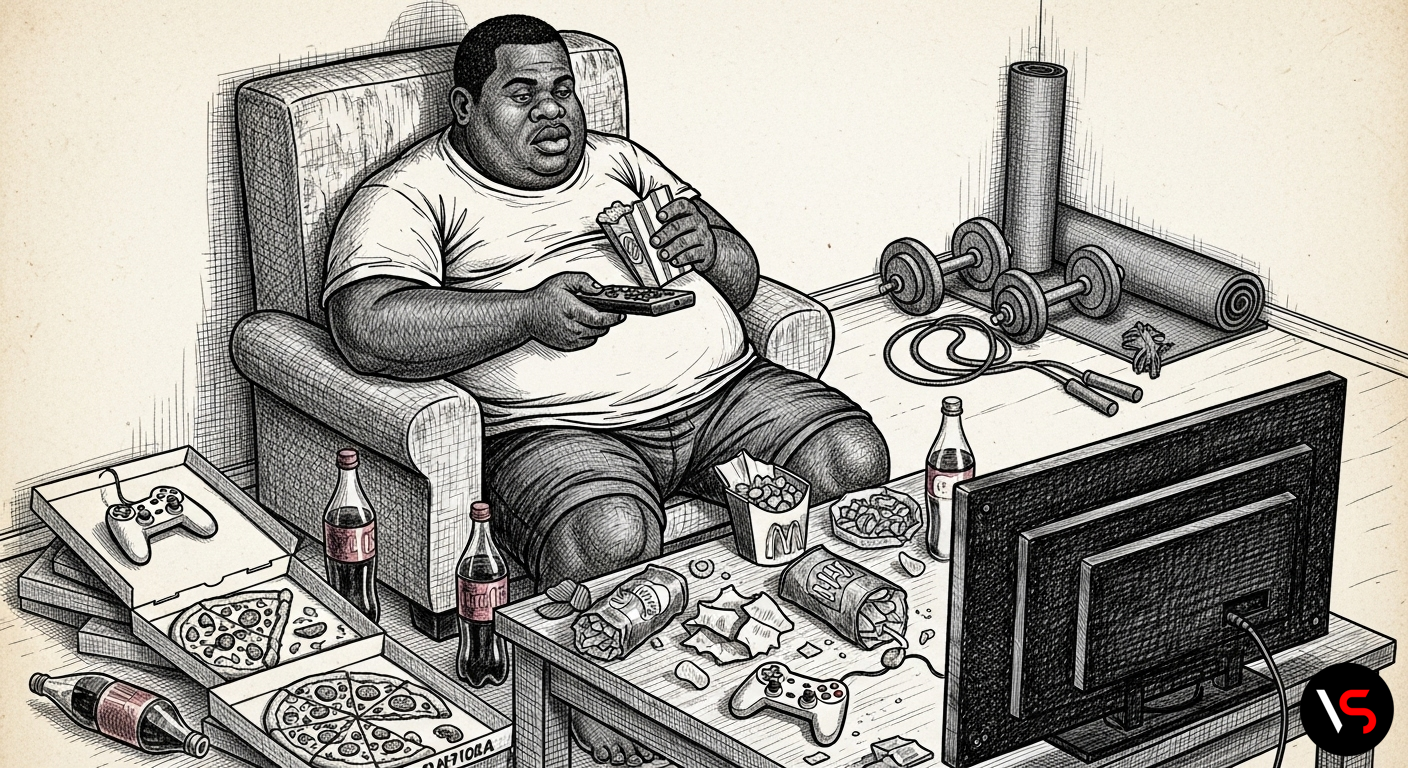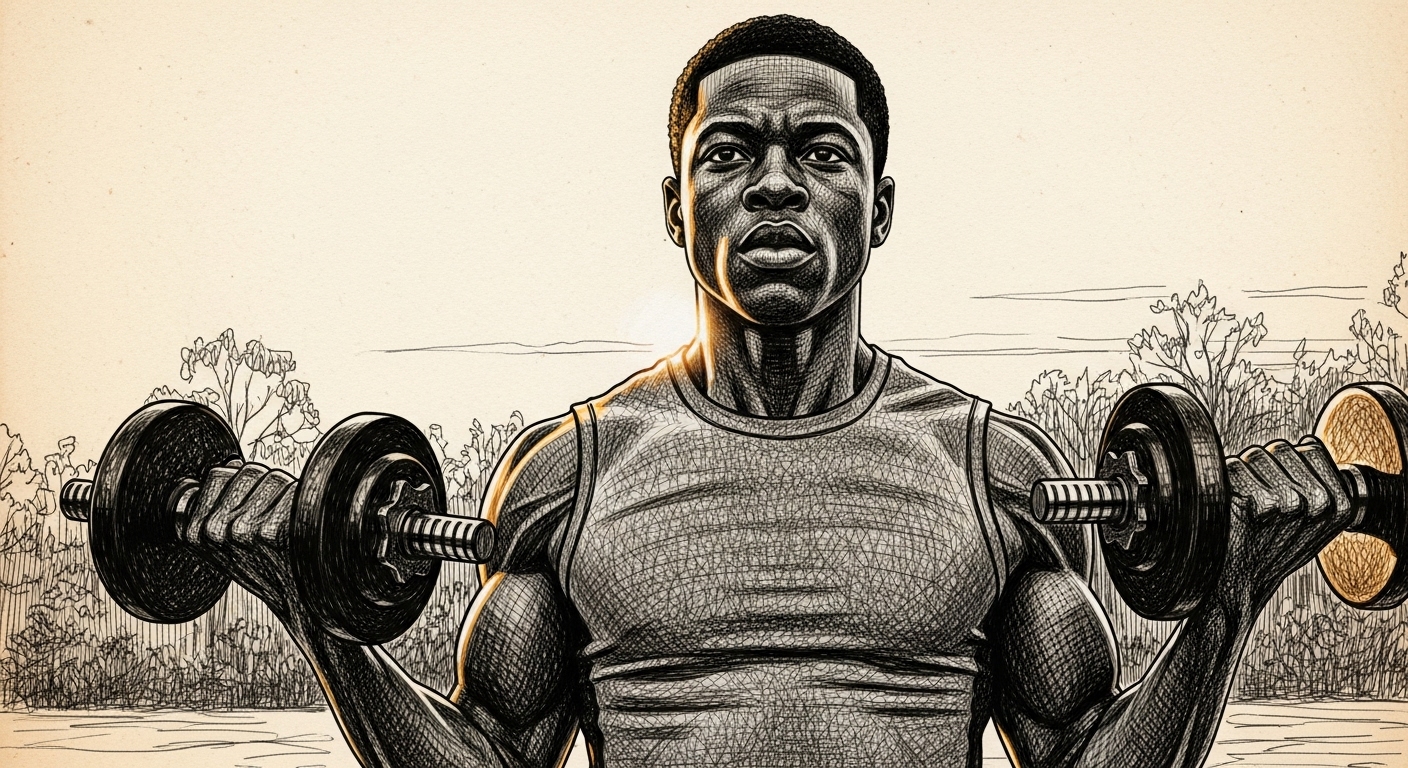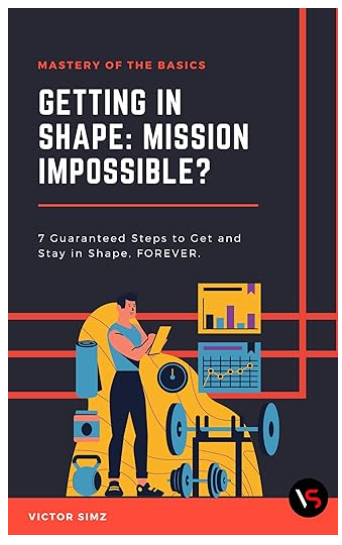
The 5 Basic Fitness Principles: The Only Fitness Advice You’ll Ever Need
Are You Confused Yet?
Confusion, that's what it is.
Walk into any gym
Scroll through social media
Or browse the self-help section of a bookstore; what will you find?
You'll find yourself drowning in a sea of conflicting fitness advice.
Some fitness gurus preach the gospel of high-intensity workouts, while others swear by slow and steady movement. Eccentric, dicentric, full range, partial reps—the list is endless!
One expert tells you carbs are the enemy; another insists they're the key to performance. One diet trends for a while before being debunked by the next big thing.
It would seem the only consistent thing about the fitness industry is inconsistency.
But here's the fact—this confusion isn't accidental; it's by design.
You see, fitness is an industry, and like all industries, it thrives on selling solutions to problems. Problems, it often creates.
So if you constantly feel like you're one new workout, one diet tweak away from success, or one supplement away from the physique of your dreams, then guess what? the machine is working exactly as intended.
But what if I told you that most of what you've been told about fitness is irrelevant?
What if I told you that fitness is not some complicated puzzle reserved for fitness influencers, athletes, biohackers, or those blessed with the so-called elite genetics and superhuman discipline?
What if I told you that, at its core, fitness is a simple science—governed by a few fundamental principles that never change, no matter how many trends come and go? Simple principles which anyone can implement successfully.
Sounds too good to be true right? well it is.
Strip away the marketing gimmicks, the flashy trends, and the endless contradictions, and what remains is a set of unshakable truths.
And perhaps the most fundamental truth of all – fitness isn't a destination; it's a way of life, woven into the way you think, move, and exist in the world.
From Survival to Selfies: The Evolution of Fitness

Real fitness isn't found in a mirror—it's found in your quality of life.
Long before gyms, protein shakes, and the obsession with mirror selfies, fitness wasn't about glamour—it was about survival.
Our ancestors didn't do squats for aesthetics; they did them whilst lifting heavy boulders, evading predators, and chasing down dinner before it sprinted away.
Strength wasn't measured in bench press numbers but in the ability to climb, hunt, and endure.
The ancient Greeks, however, took fitness to another level. They turned physical excellence into an art form, sculpting warriors and Olympians with rigorous training that would make today's toughest boot camps look like a warm-up.
You've probably heard of the Spartans. popularised by the 2007 movie "300".
Well in those days, Spartan warriors didn't work out to look good on Instagram; they trained because their very existence depended on it. Strength, endurance, and agility were the difference between victory and defeat, life and death.
Fast forward to the Industrial Revolution, and suddenly, humans swapped movement for machines. The need to be physically capable diminished, and fitness became less about survival and more about aesthetics.
By the 20th century, the fitness industry was born, with muscle-bound icons and diet fads shaping public perception.
And here we are today—bombarded with conflicting advice, chasing unrealistic fitness goals, and wondering why we feel exhausted despite all the effort.
Genetics & Body Type: Myths & Excuses We Love to Believe
Let me know if any of these statements sound familiar...
"I just have bad genes."
"My body type isn't built for this."
"Some people are just naturally fit."
Any sound familiar?
These statements are all part of the age-old excuse subscribed to by those who want an easy way out.
But let's get one thing straight: your DNA is not destiny.
Sure, genetics play a role. They influence your physical size, how your muscles insert, and whether you can eat an entire pizza without any immediate consequences.
But genetics DO NOT decide whether you get stronger, faster, or healthier (And don't be fooled by what the so-called 'latest studies' show)
That part? That's on you.
Now, I won't waste time dragging you through the endless debate on genetics.
If you're familiar with it, you already know how it ends: work hard, stay consistent, and your genes will have no choice but to follow. And if you're not familiar with it—trust me, you're not missing anything. It's just another excuse disguised as science.
The truth is, the whole "body type" debate—ectomorph, mesomorph, endomorph—is just a convenient way to box people into limitations that don't exist.
Yes, some people build muscle faster. Yes, some naturally store more fat. But no one is inescapably bound by these categories. Your body adapts to how you treat it. If you think right, train right, and eat right, your body will obey— this isn't science, it's common sense.
Results or Excuses

In this world there're only two things, results or excuses - period!
Excuses—the lifeblood of procrastination.
"I don't have time."
"I'm too tired."
"I don't have the right equipment."
"I'll start on Monday."
Does any of the above sound familiar?
Of course, they do.
We've all crafted these little justifications for not committing to exercise, wrapping them in logic to make ourselves feel better. But here's the truth: excuses are just well-dressed lies we tell ourselves to stay comfortable.
And comfort? That's the enemy of progress.
The reality is, you don't need hours at the gym, a perfect diet, or fancy gear.
In fact, step 1 to becoming fit, and perhaps the hardest step of all, has nothing to do with diet and exercise—it's shutting up that little voice in your head that keeps looking for a way of escape.
A way of escaping the truth. And the truth is, you do have time, and you do have the energy.
The only thing standing between you and your so-called fitness goals is you.
And since we're on the topic of goals, let's talk about fitness goals and why you don't need them.
Forget Goals: Focus on the Process
Goals are often seen as the holy grail of fitness
Those shiny targets that spark excitement and ambition. Hitting PRs or personal records, as some would call it.
While there's nothing wrong with giving yourself a challenge, goals in fitness are often arbitrary, fleeting milestones that can lead to frustration when we don't achieve them as planned.
We chase these goals like squirrels after acorns, only to find ourselves feeling deflated when the scale doesn't budge or when we can't do one more push-up.
A story is told of a young, earnest student who asked a grandmaster how long it would take to become like him. The master replied, "Ten years."
The student unimpressed then said, "But what if I work twice as hard and apply myself to learn twice as fast to achieve my goal. How long then?"
The master replied, "Twenty years."
The student was confused, but the master explained, "When you have one eye on the goal, you can only have one eye on the path."
So instead of obsessing over unrealistic fitness goals, what if instead you try building habits, routines, and systems?
This is where the magic happens:
When we concentrate on the daily actions we take—like choosing to move more, preparing healthy meals, or even simply getting enough sleep—we create a sustainable lifestyle that promotes fitness, regardless of any particular goal.
Consider this: you can set a goal to run a marathon, but if you don't build a consistent running routine, you'll struggle to cross the finish line.
On the other hand, if you prioritize running three times a week, no matter the distance, you're cultivating a habit that will lead to improvement over time. Eventually, the marathon goal will become a natural outcome of your dedication to the routine. makes sense?
In short, the goal is not to run the marathon, its to become a runner. The goal is not just to lose weight, but to build a lifestyle where fitness, nutrition, and self-care are second nature.
When you shift your mindset from chasing temporary results to embodying the habits of a fit, active, and disciplined person, the outcomes take care of themselves.
Motivation & Discipline. The Two Most Misunderstood Words in Fitness
Most people think that fit, active individuals are just naturally motivated to workout.
That they simply wake up every morning brimming with excitement to hit the gym, run miles, or throw weights around like it's their life's purpose.
Let's clear that up right now: they're not. And if anyone says they are, guess what they're lying.
Fact - Even the most dedicated athletes, the ones who look like they were born for the gym, don't always feel motivated to workout.
More often than not, they'd rather stay in bed, do something more relaxing, or do literally anything else—I know I would.
The reality is that motivation is unreliable.
Motivation is fleeting and flimsy. And so If you wait for motivation to show up, before you can act, you may wait a long time.
What it takes, is discipline!
Discipline is showing up, even when you don't feel like it.
Discipline is lacing up your shoes when every cell in your body is screaming, "Not today!"
It's dragging yourself through a workout because you said you would—not because you're in the mood.
Discipline is the secret behind every PR, every transformation, and every person who makes fitness a lifestyle rather than a phase.
And here's the thing:
Your body doesn't care about your feelings. It doesn't negotiate. It doesn't wait for the perfect mood, the perfect weather, or the perfect playlist. Fitness just demands that you do the work, whether you feel like it or not.
So if you're waiting to "feel" like working out, stop.
If you're hoping for some mystical surge of motivation, forget it.
Instead, build the habit. Show up. Do the work. And then do it again tomorrow. Because motivation is optional, but discipline? That's mandatory.
Is Nutrition Dark Magic?

They say you are what you eat… and if that's true, a lot of people are walking around as human-sized bags of chips and soda.
Look, exercise is critical. essential, even. But if you think you can out-exercise a bad diet, let me burst that bubble real quick—you can't. Not now. Not ever.
You can train like an Olympic athlete, sweat buckets, and push your limits in the gym, but if your diet is built on processed junk, sugar-loaded drinks, and mindless snacking, you're just spinning your wheels.
Why? Because nutrition dictates everything.
What you do in the kitchen is just as important as what you do in the gym—if not more important.
You could work out twice a day, but if you're crushing pizzas and milkshakes afterwards, congratulations—you've just undone everything.
The same goes for those who wish to build muscle. Muscle is built on protein, not just reps. Lifting heavy is great, but without proper nutrition, your muscles won't recover, grow, or get stronger.
Truth is, you can't outwork bad habits.
It takes the average person roughly 60 minutes of intense exercise to burn about 300 calories. On there other hand, it would take the same person only 60 seconds to consume 500 calories of junk food. You do the math.
At the end of the day, fitness isn't just about how often you work out—it's also about how well you fuel the machine. This is basic.
So if you're serious about results, you have to be even more serious about what you put in your mouth.
Now over the years, people have begun treating food and the topic of nutrition like it's some kind of dark magic—conjuring up spells such as "paleo', "vegan ", "low-carb," "caloric deficit," "intermittent fasting" etc.
Meanwhile, fitness gurus give out conflicting commandments about what you can and can't eat.
It's exhausting. And quite frankly, unnecessary.
Here's the truth:
Nutrition isn't witchcraft. And you don't need a PhD in biochemistry to understand how to eat well.
You don't need to count every crumb that enters your mouth like a human calculator.
You just need to understand the basics:
So here are the 5 basic principles of nutrition:
1. Calories matter, but you don't have to obsess over them.
Basics Principle 1: If you consistently eat more than you burn, you gain weight. If you eat less, you lose weight – move more, eat less.
2. Carbs aren't the villain; neither is fat. Demonizing entire food groups is like blaming one player for a team's loss.
Basic Principle 2: All nutrients are important. Carbs give energy. Fat supports brain function. Protein builds muscle. They all have a role—stop treating them like opposing factions in a war.
3. Diets work… until they don't. Keto, paleo, carnivore, vegan, juice cleanses, whatever. They all "work" if they create a calorie deficit, but if they're miserable and unsustainable, you'll quit.
Basics Principle 3: Any diet can work for weight loss if it creates a calorie deficit. But If you can't keep up with a diet. Guess what? it's not the right one for you.
4. Eat like an adult—less like an unsupervised toddler at a birthday party.
Basic Principle 4: Eat more real food, fewer ultra-processed junk foods.
5. Hydration affects everything—energy levels, digestion, muscle recovery, even hunger.
Basic Principle 5: Drink enough water
The Basics of Fitness

Now that we understand the basics of nutrition, let's look at the basics of fitness overall.
To begin with, as you may have realised by now, fitness isn't about flashy gimmicks.
It's not about overpriced supplements, or that influencer who swears by some "secret hack" or "the one exercise."
Fitness is about understanding the fundamentals—the tried-and-true principles that actually work, not the ones designed to sell you something.
So, before you go hunting for the next miracle solution, let's get back to basics—the stuff that actually matters. If you master these fundametals, you won't need some superfood, trainig routine or a 5 Star rated influencer.
You'll be the one writing your own fitness success story.
The Basics of Fitness
Principle 1: Mindset is Everything
Changing your mindset around fitness is essential for success, as your mindset shapes self-perception and ultimately your identity.
A person once woke up in the hospital from a coma after several weeks in poor physical shape. Having lost their memory, the doctor went on to explain that they were a retired special forces operative that had been hurt after an act of volour that save many lives.
Immediately, they were released, they got back to the disciplined life of a special forces operative and were soon back in good physical shape. Months past and they continued with their lifestyle. But soon their memory came back and they had a grave realisation.
When they went back to the hospital the doctor confirmed what they had remembered. They were not a retired special forces operative. They were a retired school teacher who had apparently lived a very mandane life. They doctor had read the wrong file. But by then, the teacher had already adopted another identity.
The moral of the story is this, you'll never act consistently in a manner that is inconsistent with your identity. With whom you belive you are.
When individuals view themselves as athletes or fitness enthusiasts, they are more likely to engage in regular exercise and healthy eating. This alignment between mindset and identity helps maintain consistency in behaviors, reduces cognitive dissonance, and empowers individuals to overcome challenges, ultimately leading to long-term fitness success.
Principle 2: Movement is Essential
Fitness is about movement. Staying active throughout the day is crucial for reducing health risks linked to prolonged sitting, which is now consdered the new smoking.
While traditional gym workouts are beneficial, integrating various forms of movement into daily life is equally important. Simple activities such as walking more, taking the stairs, stretching at your desk, and alternating between sitting and standing can significantly enhance overall fitness.
Additionally, engaging in sporting activities and active hobbies like gardening or dancing can make fitness enjoyable and sustainable. By viewing fitness as a holistic approach that includes all aspects of life, you can create a dynamic lifestyle that promotes physical, mental, and emotional well-being, ultimately leading to lasting health benefits without relying solely on structured workout routines.
Principle 3: Nutrition is King
Nutrition plays a pivotal role in overall health and fitness.
As alluded to, exercise alone cannot compensate for poor dietary choices. Prioritizing whole, nutrient-dense foods—such as fruits, vegetables, whole grains, lean proteins, and healthy fats—provides the essential vitamins and minerals necessary for optimal bodily function, energy levels, and recovery from workouts.
Conversely, heavily processed and overly sugary foods can lead to inflammation, weight gain, and other health issues that undermine fitness goals.
Therefore, adopting a mindful approach to food and eating can enhance overall wellness and performance, ultimately leading to better health outcomes. Thus, making informed nutritional choices is essential for anyone seeking to improve their fitness and maintain long-term health.
Principle 4: Knowledge is Power
Seeking knowledge about fitness and nutrition is essential for achieving long-term health and wellness, as it empowers individuals to make informed decisions rather than simply following trends or advice from others without understanding their implications.
While well-intentioned recommendations can be helpful, they may not always be suitable for everyone due to individual differences in body types, health conditions, and lifestyle factors. Therefore, gaining a solid understanding of how various foods affect the body, the role of macro and micronutrients, and the principles of effective exercise enables individuals to tailor their approach to meet their unique needs and goals.
Additionally, knowledge fosters critical thinking, allowing people to discern between evidence-based practices and popular myths or fads. This self-education leads to greater accountability and motivation, as individuals who understand the 'why' behind their choices are more likely to commit to their fitness and nutrition plans.
Ultimately, empowering oneself with knowledge creates a sustainable and personalized path to health and fitness, encouraging a lifelong commitment to well-being that adapts to changing circumstances.
Principle 5: Consistency is Key
Consistency is the foundation of progress, as the body adapts and strengthens over time through repeated practice. Therefore, achieving fitness goals requires regular effort and commitment rather than relying on occasional bursts of intense activity.
Even small, manageable workouts performed consistently yield better long-term results than infrequent, high-intensity sessions that may lead to burnout or injury. Establishing a sustainable routine—whether through daily movement, structured exercise, or mindful nutrition—ensures gradual but steady improvement in strength, endurance, and overall health.
Moreover, consistency helps build discipline and habits that make fitness a natural part of everyday life rather than a temporary effort. By focusing on regular, achievable actions rather than drastic changes, you can create a lasting, sustainable approach to fitness that delivers real, long-term benefits.
That's it!
That's the whole fitness game. All the other topics are covered by these 5 fundamentals.
No secrets, No sorcery, No…the one thing, No superfoods, No sacred rituals. Just the basics.
But where are the recommended exercises and dieting programmes you ask?
Well, at this point, there's nothing!
I won't hand you a cookie-cutter workout plan or a one-size-fits-all diet because, frankly, that would be doing you a disservice.
If you're serious about fitness—really serious—you won't just take someone's word for it. You'll make it your mission to learn, to experiment, to apply what works, and discard what doesn't.
Too many people fall into the trap of blindly following books or fitness influencers, chasing after the next miracle routine or superfood that promises the dream physique in 30 days.
But like I said, each ones fitness journey is unique, and you have to be the principal architect of your own fitness. Only then will you succeed.
As Jim Rohn once put it:
Don't be a follower, be a student.
The difference between a follower and a student is simple. Followers mimic. They do what they're told without questioning. Students, on the other hand, study the game. They dig into the why, they test, they refine, and they own their results.
In other words, listen to me, listen to the so-called fitness gurus but at the end of the day, make sure that your decisons are the product of your own conclusions.
If you want lasting progress, don't be a follower. Be a student. A student of fitness, a student of nutrition, a student of healthy living.
So how do you win at fitness?
Read. Watch. Question. Try. Fail. Adjust. Repeat –That's how you win.
So no, I won't tell you exactly what to do. It's all up to you.
You have two options, you can throw away this information and move on to the next glittery thing. Do nothing, and remain the same.
But if you're serious, as in really serious, you'll begin apply what you've learnt. You'll do the work—and that, right there, will be the measure of your commitment and the principal determining factor o your success.
💥 Transform Your Body. Master Your Discipline. 💥
For less than the price of a cup of coffee, you can take the first step toward a stronger, healthier, more focused you.
My first fitness book is available on Amazon for under $3 — packed with real, no-fluff strategies to build lasting habits, unlock energy, and Take Command of your life.
👉 Tap the cover of HERE, grab your copy, and start your transformation today.
🎯 Ready to Take Command of Your Life?
Subscribe to the Take Command Weekly Newsletter and get powerful mindset tools, tips, strategies, and weekly motivation delivered straight to your inbox.
📬 Enter your email below and start your journey to mastery.

